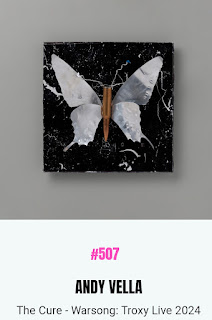From The Times:
Tim Pope: my golden age of music videos from Bowie to the Cure
Tickets: https://www.fringebythesea.com/tim-pope/
At Wavelength, a new music film festival at Fringe by the Sea, the director will talk about his 50 years at the cultural coalface.
One autumn afternoon in 1982, Tim Pope, a budding film director, had a life-changing meeting on the roof of an office block in Soho in London. A young goth by the name of Robert Smith had enjoyed a music video that Pope had made for the synth duo Soft Cell (for their single Bedsitter) and wanted some of that creative magic for his own band, the Cure.
Was there immediate chemistry? Undeniable sympatico? Not quite. “We were what I’d call shy bastards,” Pope recalls. “We rarely met eyes with each other, and he had a very quiet voice, so it was hard to hear him over the noise coming from the fruit market outside. I had no idea it would be the start of an almost 50-year relationship.”
Beginning with a promo for the Cure’s uncharacteristically upbeat single Let’s Go to Bed, that collaboration spawned more than 35 extraordinary videos (and counting) as part of Pope’s extensive career. He’ll be talking about these experiences, and many more, at Fringe by the Sea, in an event that’s a trail for his forthcoming memoir, which has the working title My Wonky Eye: The Tales of a Maverick Music Director, out next year.
“It follows the arc of my relationship with David Bowie via Iggy Pop,” Pope says about a book that’s going to be devoured by music fans. “That’s the main story, but along the way I work with lots of other bands.”
Those others include Neil Young, whose playful side Pope is good at teasing out, Talk Talk, Queen and The The, and what the films have in common is technical ambition (all done before the days of green screen), a sense of humour and a colourful disregard for authority. As he puts it: “I’ve got quite a rebellious streak and I think that’s what connected with the artists who also had one.”
Another common thread is the glee with which Pope playfully tortures his bands — from hanging them upside down and swinging cameras into their faces to trapping them in tight spaces — all for the perfect shot.
A great example is the claustrophobic masterpiece Close to Me, for which he got the Cure (who’d been “partying” for several hours beforehand) squashed up into a wardrobe, which he then flooded with water. For The Lovecats video he had the band dancing about in a woozy world of threadbare feline taxidermy; while for Lullaby Smith was cocooned by spider webs made from glue, had a micro camera in a medical probe inserted into his mouth, and was eventually swallowed up by a giant spider.
When the book comes out it will include some never-before-seen photos from these shoots, including a selfie of Pope and Smith just as they were finishing the Lullaby video — “Just at the end, when he called me a bastard,” the director says with a laugh.
In many ways it was a golden age of music videos, with — in Pope’s experience at least — the artists given artistic carte blanche, free from the constraints of corporate intervention. As a result boundaries weren’t so much pushed as blown up at times, as evidenced in the gory video for Soft Cell’s outrageous Sex Dwarf, which was, unsurprisingly, banned. (Word to the wise: do not watch this video in the workplace.)
Pope recently found the call sheet with a list of props for that shoot, which included a working chainsaw, raw meat and some maggots. “I can still smell that studio,” he recalls.
One of Pope’s early jobs, shortly after leaving television school, was making films to help train politicians, and he was often in Downing Street in the dying days of the 1970s Labour government. He would “borrow” equipment to film gigs in the evenings, and at one performance by the Specials some skinheads invaded the stage, headbutted him and grabbed the expensive camera.
These kinds of scuffles were a world away from his later success. He developed such a strong relationship with Bowie that the singer asked him to direct his 50th birthday concert at Madison Square Garden, in New York, requesting that he be his “eyes and ears” on the day.
As well as working on the book, Pope is planning to make a feature film called The Beating of a Moth’s Wing, starring Béatrice Dalle, who graced many a student’s bedroom wall in the 1990s.
Also on the horizon is a 50th-anniversary film for the Cure, hopefully due out in 2028. “Robert’s got 50 boxes of film no one’s ever seen,” he says. “It’ll be amazing for fans.”
This Fringe by the Sea session, hosted by Vic Galloway, will also be a treat for music fans, with Pope more than happy to answer questions and share memories. Start revising those videos now to get the best out of it.
Aug 2, 2.45pm, the Dome, £12/6












